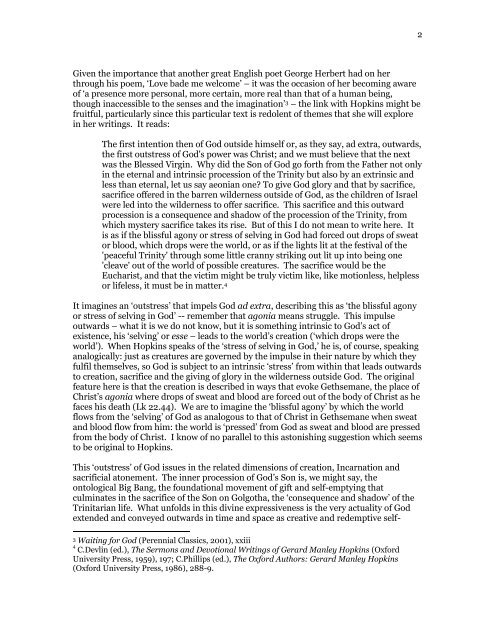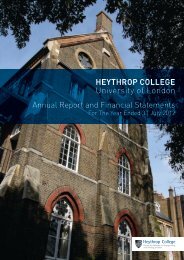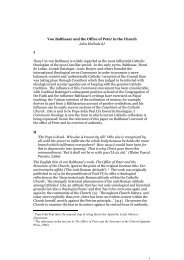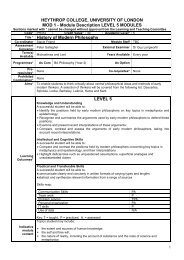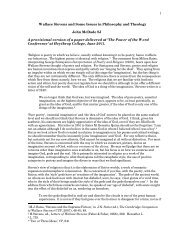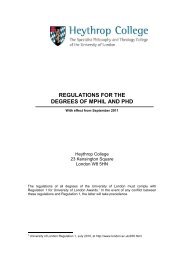Simone Weil: Affliction and Necessity
Simone Weil: Affliction and Necessity
Simone Weil: Affliction and Necessity
You also want an ePaper? Increase the reach of your titles
YUMPU automatically turns print PDFs into web optimized ePapers that Google loves.
2Given the importance that another great English poet George Herbert had on herthrough his poem, „Love bade me welcome‟ – it was the occasion of her becoming awareof „a presence more personal, more certain, more real than that of a human being,though inaccessible to the senses <strong>and</strong> the imagination‟ 3 – the link with Hopkins might befruitful, particularly since this particular text is redolent of themes that she will explorein her writings. It reads:The first intention then of God outside himself or, as they say, ad extra, outwards,the first outstress of God's power was Christ; <strong>and</strong> we must believe that the nextwas the Blessed Virgin. Why did the Son of God go forth from the Father not onlyin the eternal <strong>and</strong> intrinsic procession of the Trinity but also by an extrinsic <strong>and</strong>less than eternal, let us say aeonian one? To give God glory <strong>and</strong> that by sacrifice,sacrifice offered in the barren wilderness outside of God, as the children of Israelwere led into the wilderness to offer sacrifice. This sacrifice <strong>and</strong> this outwardprocession is a consequence <strong>and</strong> shadow of the procession of the Trinity, fromwhich mystery sacrifice takes its rise. But of this I do not mean to write here. Itis as if the blissful agony or stress of selving in God had forced out drops of sweator blood, which drops were the world, or as if the lights lit at the festival of the'peaceful Trinity' through some little cranny striking out lit up into being one'cleave' out of the world of possible creatures. The sacrifice would be theEucharist, <strong>and</strong> that the victim might be truly victim like, like motionless, helplessor lifeless, it must be in matter. 4It imagines an „outstress‟ that impels God ad extra, describing this as „the blissful agonyor stress of selving in God‟ -- remember that agonia means struggle. This impulseoutwards – what it is we do not know, but it is something intrinsic to God‟s act ofexistence, his „selving‟ or esse – leads to the world‟s creation („which drops were theworld‟). When Hopkins speaks of the „stress of selving in God,‟ he is, of course, speakinganalogically: just as creatures are governed by the impulse in their nature by which theyfulfil themselves, so God is subject to an intrinsic „stress‟ from within that leads outwardsto creation, sacrifice <strong>and</strong> the giving of glory in the wilderness outside God. The originalfeature here is that the creation is described in ways that evoke Gethsemane, the place ofChrist‟s agonia where drops of sweat <strong>and</strong> blood are forced out of the body of Christ as hefaces his death (Lk 22.44). We are to imagine the „blissful agony‟ by which the worldflows from the „selving‟ of God as analogous to that of Christ in Gethsemane when sweat<strong>and</strong> blood flow from him: the world is „pressed‟ from God as sweat <strong>and</strong> blood are pressedfrom the body of Christ. I know of no parallel to this astonishing suggestion which seemsto be original to Hopkins.This „outstress‟ of God issues in the related dimensions of creation, Incarnation <strong>and</strong>sacrificial atonement. The inner procession of God‟s Son is, we might say, theontological Big Bang, the foundational movement of gift <strong>and</strong> self-emptying thatculminates in the sacrifice of the Son on Golgotha, the „consequence <strong>and</strong> shadow‟ of theTrinitarian life. What unfolds in this divine expressiveness is the very actuality of Godextended <strong>and</strong> conveyed outwards in time <strong>and</strong> space as creative <strong>and</strong> redemptive self-3 Waiting for God (Perennial Classics, 2001), xxiii4 C.Devlin (ed.), The Sermons <strong>and</strong> Devotional Writings of Gerard Manley Hopkins (OxfordUniversity Press, 1959), 197; C.Phillips (ed.), The Oxford Authors: Gerard Manley Hopkins(Oxford University Press, 1986), 288-9.


